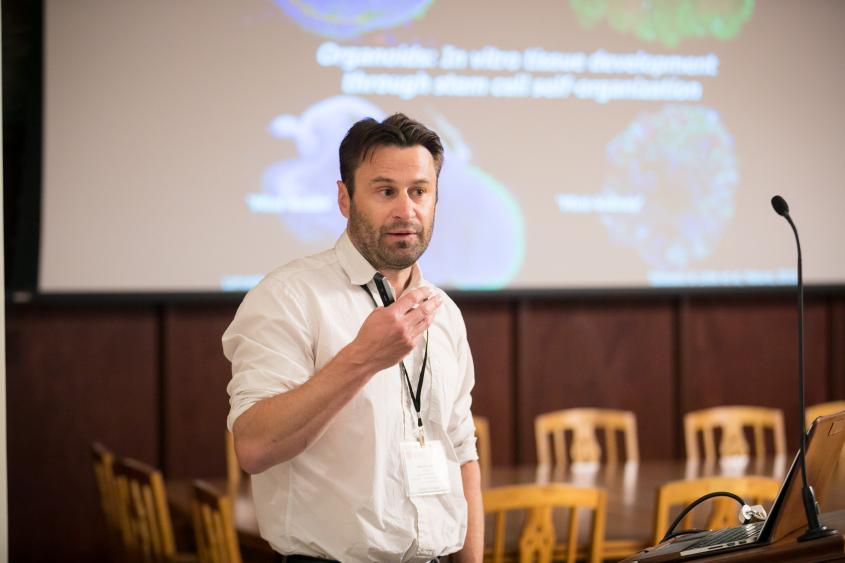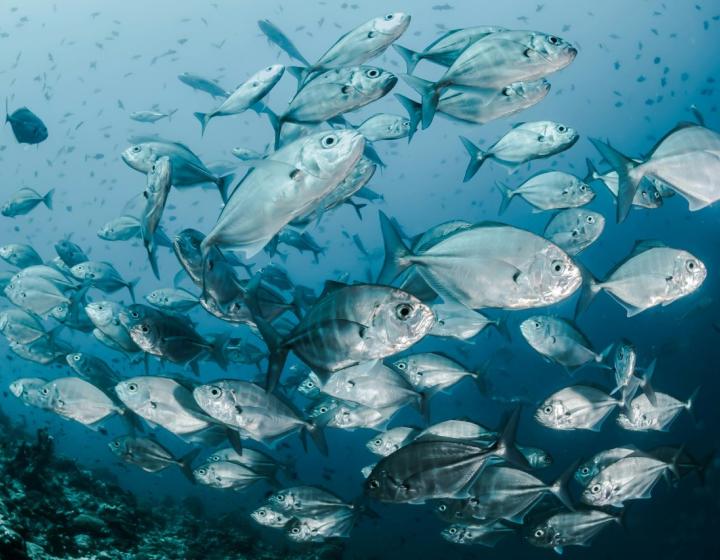Cornell Stem Cell Retreat sparks collaboration and conversation
_MG_2665.jpg

Matthias P. Lütolf, professor and director of the laboratory of stem cell bioengineering at École Polytechnique Fédérale De Lausanne, gave the keynote talk at the Cornell Stem Cell retreat.
With discussions that ranged from battling mastitis to regenerating muscles, experts in stem cell science gathered at the Cornell Laboratory of Ornithology’s sunlit atrium to exchange knowledge and ideas at the 2018 Stem Cell Program Retreat. Professor of Pathology Alexander Nikitin, leader of the Cornell Stem Cell Program and director of the Cornell Training Program in Stem Cell Research; Professor of Molecular Biology and Genetics Tudorita Tumbar, Chair of the Stem Cell Seminars and Meetings Committee; and Benjamin Cosgrove, assistant professor of biomedical engineering, organized the program. “With over one hundred participants, this was by far the largest attendance we’ve had at the retreat,” says Nikitin. “As always, the talks were of high quality and represented a broad range of contemporary topics in basic and translational research, biomedical engineering and regenerative medicine.”
The retreat is a biennial event of the Cornell University Stem Cell Program (CSCP), a cross-campus organization founded by Nikitin and supported by the Office of Office Vice Provost for Research and the College of Veterinary Medicine. Attendees included researchers and trainees from the College of Veterinary Medicine, Weill Cornell Medicine, the Meinig School of Biomedical Engineering, the Sibley School of Mechanical and Aerospace Engineering, and the Department of Molecular Biology and Genetics. Since 2008, CSCP annually organizes symposia and retreats. Held on alternating years, CSCP symposia are large events intended to stimulate exchange of experience with researchers outside of Cornell. CSCP Retreats aim to bring the stem cell research community together in a more intimate and casual setting, with talks by CSCP faculty, keynote speaker, break-out sessions and poster sessions.
Engineering organoids
Matthias P. Lütolf, professor and director of the laboratory of stem cell bioengineering at École Polytechnique Fédérale De Lausanne gave the keynote talk this year. He described his research with organoids— stem-cell-based cultures that develop into miniature, simplified versions of its organ of origin. Lütolf’s lab examines organoids to elucidate the key microenvironmental factors that dictate stem cell differentiation; they found that varying the stiffness of the gel the stem cells grow in changes how that cell would differentiate. “We are interested in how tissue shape feeds back into gene expression to control cell fate choices and patterning,” said Lütolf.
 Lütolf also showcased his bioengineered intestinal epithelium—a hydrogel tube shaped with ‘crypts’ or deep wells in the surface of the tube that mimic the surface of the epithelium. Lütolf’s team seeded the tube with intestinal stem cells that clustered to these wells and soon coated the entire hydrogel tube, forming a self-sustaining system of intestinal cells that behave very similar to their in vivo counterparts. “These cells are actually active—you can measure their turn-over of amino acids, you can see how the tissue becomes more functional over time. It achieves homeostasis over time,” said Lütolf. This novel system opens up new avenues for studying interactions between intestinal cells and bacteria, intestinal cell regeneration.
Lütolf also showcased his bioengineered intestinal epithelium—a hydrogel tube shaped with ‘crypts’ or deep wells in the surface of the tube that mimic the surface of the epithelium. Lütolf’s team seeded the tube with intestinal stem cells that clustered to these wells and soon coated the entire hydrogel tube, forming a self-sustaining system of intestinal cells that behave very similar to their in vivo counterparts. “These cells are actually active—you can measure their turn-over of amino acids, you can see how the tissue becomes more functional over time. It achieves homeostasis over time,” said Lütolf. This novel system opens up new avenues for studying interactions between intestinal cells and bacteria, intestinal cell regeneration.
“I really enjoyed the keynote talk,” said Divya Shiroor, a PhD student with Carolyn Adler’s lab in the Department of Molecular Medicine. “It’s really helpful to see how someone connects other fields into biology.” She also appreciated the breakout session in which she and other graduate students chatted with Lutholf about his work and his academic career.
Diverse topics
Other talks covered a wide range of topics, from imaging in vivo behavior of intestinal stem cells to heart valve regeneration. Poster presentations touched on stem cells in wound healing, breast cancer, ovarian cancer and, and hair follicle homeostasis—to name just a few projects. Many posters showcased research collaborations between labs across Cornell’s campus. “These collaborative studies really demonstrate the level of synergy the stem cell program fosters,” said Nikitin.
Judges evaluated these posters as part of the retreat’s poster competition, awarding first place to Blaine Harlan, a graduate student in the Nikitin lab, for her poster presentation, “Elusive epithelial stem cells of the uterus.” Second place went to Megan Rothstein, graduate student in the Department of Molecular
Biology and Genetics, for her poster titled “A TFAP2-mediated molecular switch for neural crest induction and specification.” Third place went to Divya Shiroor for her poster, “Injury promotes stem cell survival following radiation in planarians.” Shiroor was honored to receive the recognition. “As part of a new lab at the college, we really value being part of this community and feeling its support,” she said. “It really does mean a lot to be recognized for this work.”
In keeping with the retreat’s productive track record, the event highlighted the unique strengths that Cornell’s research community offers, and continued to foster the robust cross-disciplinary collaborations between basic and applied research. “Stem cell research is a very dynamic area of science,” said Nikitin. “The recent advances, such as CRISPR/Cas9 gene editing and organoid culture, have provided an opportunity to study normal and pathological processes in a broad variety of species. Research in stem cell biology and regenerative medicine occurs not in isolation but interfaces with other disciplines, such as genomics, cancer research, neurobiology, and more. Not surprisingly, since its foundation, our program increased from 14 to 54 labs. There is strong enthusiasm about stem cell research on campus and it’s been exciting to see how our program provides an essential platform for researchers to network, collaborate and learn from each other.”




